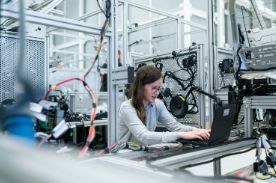*https://www.aspcapetinsurance.com/media/1137/veterinarian-guide-to-pet-insurance-jan9.pdf
Posted by Michelle Ecker on February 24, 2021

At the heart of this conversation lies the impact of technology on today’s manufacturing workforce. While workers of the past drove virtually every aspect of the manufacturing workflow by hand, over time many of these manual processes have been delegated to the work of more efficient, artificially intelligent machinery. Take Caterpillar Inc. for example, an American Fortune 500 manufacturing company whose Marine Division alone saved $400K per ship per year as of 2020 after machine learning analyzed data on how often their ship hulls should be cleaned for maximum efficiency.
Lost in translation, however, seems to be the way in which this machine intelligence impacts the workers who used to make these decisions and complete those analyses by hand. Many people seem to assume technology has simply replaced human workers within the manufacturing workplace, but the reality is that manufacturing jobs are in high demand- they’re just changing and becoming more reliant on employee ability to maintain and operate the technology being described. These jobs are by no means being replaced, in fact in 2018 alone the U.S. manufacturing industry added 327,000 jobs, which CNBC reports as the most substantial growth of any 12-month period this industry has seen since 1995.
As a leading manufacturing skills training provider, Penn Foster has a long history of providing skills training and educational programs, along with robust support and services, to the manufacturing workers of today. Penn Foster’s online and blended learning programs are delivered in a self-paced, competency-based model wrapped by comprehensive academic, professional and personal support and coaching.
From configurable training programs designed to meet specific, tailored needs of each organizational partner, to multi-year apprenticeships, Penn Foster’s skills-based portfolio of training solutions were designed to help provide upward career mobility to today’s workers while delivering productivity and efficiency outcomes within any manufacturing organization. Contact a training expert today to find out how you can leverage flexible training for your workforce.
Fill out the form below to receive additional information from Penn Foster
Fill out the form below to receive additional information from Penn Foster
Fill out the form below to receive additional information from Penn Foster